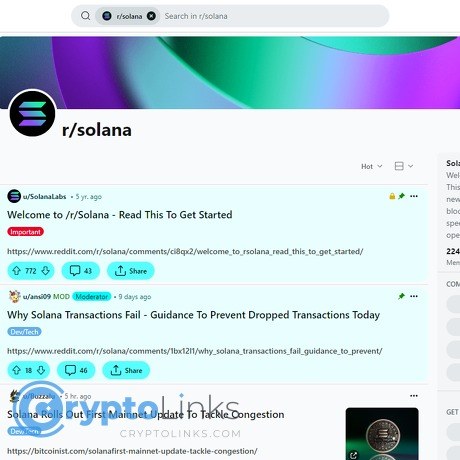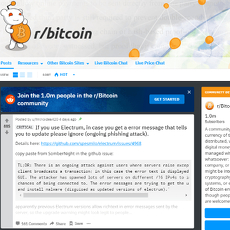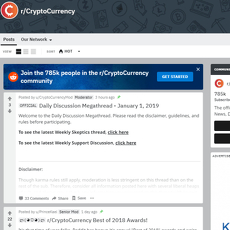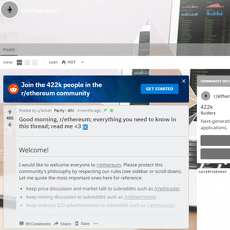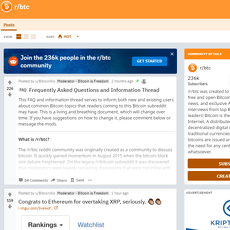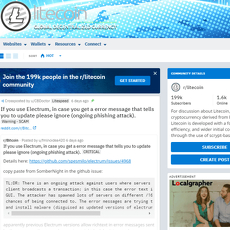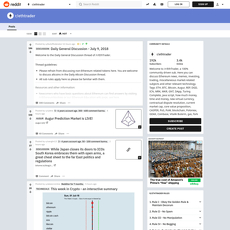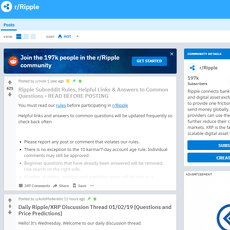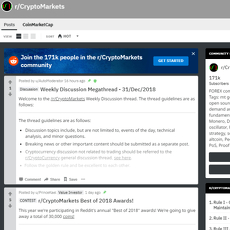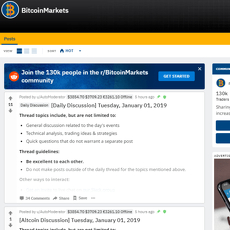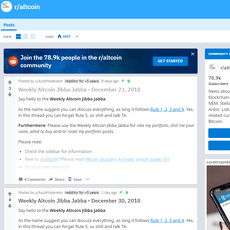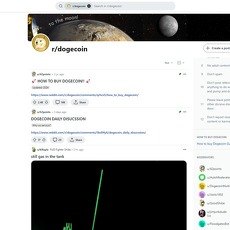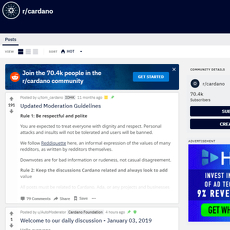r/Solana Review
r/Solana
www.reddit.com
r/Solana Review Guide: Everything You Need to Know + FAQ
Still wondering if r/Solana is worth your time—or just another noisy crypto echo chamber?
I’ve spent a lot of time inside that subreddit, watching how great insights get posted, how they get buried, and how the best answers usually live in the comments you’d miss if you’re skimming. In this guide, I’ll show you how to use r/Solana like a pro: find real insights, spot quality posts fast, and avoid the hype and scam traps that waste time (and sometimes money).
If you want smarter market takes, useful dev threads, and faster answers to wallet or staking questions, this is your shortcut.
Where most people get stuck
It’s easy to get lost in price posts, recycled rumors, and shill comments. The pace on r/Solana is fast—great for breaking updates, bad for quality control. Good posts can fall off the front page in hours, especially when memes and hot takes hit at the same time as real news.
- “Hot” sort buries nuance: quick reactions rise, thoughtful analysis sinks.
- Recycled narratives: the same “next 100x” coin, airdrop bait, and “SOL $10k soon” arguments repeat daily.
- Shill and referral spam: low-effort posts slip through and crowd out real discussions.
- Scam friction: fake support DMs and “connect wallet” traps exploit urgency during outages or hot launches.
Fast comments ≠ good answers. You need a system that surfaces signal, not heat.
What I’m going to help you do
I’ll show you exactly how to filter by flairs, use daily threads, sort by the right signals, and follow trusted contributors so you get answers without wasting hours.
Real, practical examples you’ll use immediately:
- Filter by flair: sort for Discussion, Dev, Question, or News so you’re only seeing what fits your goal.
- Use the right sort at the right time: “Top (Today/This Week)” for sentiment and best takes; “New” for fresh bugs, fixes, and breaking notes.
- Live in the megathreads: daily/weekly Q&A and market threads condense the smartest replies—often from validators, wallet maintainers, and experienced builders.
- Search like a pro: look for patterns such as “transaction simulation failed,” “stake account inactive,” or “RPC timeout” and scan for solved comments with edits/updates.
- Follow the helpers: click through to profiles of frequent fixers (auditors, validators, devs), then check their comment history for consistent, high-quality advice.
Who this guide is for
- First-time buyers: you want to buy your first $1 of SOL and not get tripped up by fees, bad links, or old advice.
- Airdrop hunters: you want legit, mod-tagged guides and a simple checklist to avoid phishing.
- Builders and devs: you want fast answers to Anchor/SDK issues, error codes, RPC quirks, and security best practices.
- Stakers and validators: you want to track commission changes, MEV discussions, outage analyses, and trusted setup walkthroughs.
- Curious lurkers: you want the real state of the network—what’s working, what’s not—without getting caught in hype cycles.
What you’ll learn
- How the subreddit works: the rhythm, the flairs that matter, and the posts that consistently add value.
- What to read, what to skip: clear signals that a post is worth your time—and red flags that it’s not.
- Safety checks: quick link verification, impostor spotting, and permission hygiene so you stay protected.
- Quick answers to hot questions: yes, including “$10k SOL?” “$500 in 2025?” and “How to buy $1 of SOL?”—with balanced context and links.
Quick disclaimer
Nothing here is financial advice. I’m sharing my process to help you use r/Solana smarter. Always verify links on official sources, never share your seed phrase, and take your time—urgency is the scammer’s best friend.
Ready to get the edge? Next, I’ll show you the subreddit’s real “map”: size, vibe, and exactly what gets traction so you can spot the good stuff in minutes. Curious which threads consistently outperform the feed—and why?
r/Solana at a glance: size, vibe, and what gets traction
r/Solana is one of those rare places where price memes and real engineering updates share the same stage. It’s a large, fast-moving subreddit with six-figure membership and a constant stream of posts. If crypto Twitter is the stadium, this feels like the workshop—loud, crowded, but full of people actually fixing things.
“Come for the price chart, stay for the fix that saves your SOL.”
Traction leans toward timely, useful, and verifiable content. Posts with receipts—charts, tx links, code snippets, official announcements—rise faster than pure opinion. That pattern isn’t random; social research backs it. In a randomized experiment published in Science, early positive signals boosted a post’s odds of snowballing engagement, a.k.a. the “upvote bias” effect (Muchnik, Aral, Taylor, 2013). In a subreddit that moves this quickly, those first few minutes matter.
Community vibe and pace
Expect a steady hum with sudden spikes whenever a major release, outage, or airdrop rumor hits. The mood swings between:
- Hype bursts around upgrades, big ecosystem launches, or fee changes.
- Hands-on troubleshooting when wallets hang, RPCs throttle, or programs error out.
- Builder energy as devs share progress, benchmarks, and post-mortems.
What a typical day looks like for me:
- Early hours US/EU: price/market threads surge, along with quick “is this down?” checks.
- Workday blocks: dev-flair posts, SDK updates, RPC performance notes, validator chatter.
- Evening: tutorials, recap threads, and more speculative takes.
Sample post titles you’ll see (and that often get traction):
- “SOL fees today vs last month — charts + memcmp fix notes”
- “Anchor error 0x1780 — here’s what actually fixed it”
- “Is SOL going to $500 if inflows keep up? On-chain view, not hopium”
- “Heads up: new fake Phantom extension pushing QR ‘approvals’”
Mods do a lot of behind-the-scenes cleanup. Across Reddit, millions of spam items get removed each year (see Reddit’s Transparency Report), and r/Solana benefits from active moderator eyes. That said, speed cuts both ways—what’s great can get buried fast.
What gets posted most
Here’s the content that floods the feed and why it sticks:
- Price and speculation: targets, inflows, halving spillover, risk talk. Posts that include on-chain views, liquidity context, or macro clues get upvotes; thin “to the moon” calls fizzle.
- Network performance: release notes, fee market updates, throughput snapshots, outage analyses. Concrete metrics and validator POVs do well.
- NFT and gaming: marketplace changes, new mints, creator AMAs, game trailers, bot protection tips. Screens, timelines, and links to official channels help.
- Airdrops and points: eligibility checks, snapshot warnings, anti-sybil tips. Mod-tagged or community-verified guides earn trust; blind “connect wallet” links get flagged.
- Staking and validators: commission changes, MEV/priority-fee talk, which validator to pick, hardware setup guides.
- Tutorials and fixes: wallet migration steps, Ledger walkthroughs, program error explanations, RPC provider comparisons.
Patterns I’ve noticed:
- Fresh + useful beats loud. New information with proof outperforms recycled takes.
- Specific > vague. “Code + logs + link” wins against “it broke” vents.
- Official source links stabilize sentiment quickly (wallet blogs, GitHub releases, validator dashboards).
Flairs and rules that matter
Flairs are your best friends for sorting signal quickly. You’ll commonly see:
- Discussion — market takes, ecosystem debates, long threads.
- Question — wallet issues, staking choices, “which RPC?”
- Dev — code, SDKs, error fixes, audits, performance notes.
- News — official releases, funding updates, security notices.
- Tutorial/Guide — how-tos, setup steps, troubleshooting.
How I use them fast:
- Click a flair to filter the subreddit feed to only that topic.
- Skim “Dev” and “News” first on busy days; add “Tutorial” when I’m setting up tools.
- Spot “Mod Post” or pinned items for verified updates and megathreads.
Rules you’ll actually feel:
- No referral spam or low-effort shills. These get removed fast.
- Impersonation and fake support are not tolerated—report DMs and sketchy links.
- Proof > promises. Claims without sources will get called out and often downvoted.
When a post disappears, it’s usually for one of those reasons. If you’re sharing something legit, add sources—your odds of sticking go way up.
Weekly patterns to watch
There’s a rhythm to the week if you look for it:
- Recurring megathreads: market/Q&A posts that centralize questions and top answers. They’re often pinned—worth subscribing to comments.
- Release waves: cluster of posts when validator/client versions land; watch for patch notes and validator reaction threads.
- Community spotlights: legit builders sharing demos, audit reports, or shipping logs. These threads often surface niche but valuable tools.
- Seasonality: airdrop/points “seasons” bring eligibility posts and safety reminders; expect more phishing attempts then too.
Micro-heuristics I keep in mind:
- Pinned first, then fresh: check the pinned post, then scan newest for timely issues.
- Comments > titles: the highest-signal insights are often in the top 10 comments from known devs/validators.
- Early upvotes snowball: that Science study on social influence bias explains why timing matters—don’t assume early hype equals truth, verify.
Want a simple way to cut through the noise so the best posts find you in minutes, not hours? Next, I’ll show you the exact sorting, filters, and tells I use to lock onto real signal fast—curious which two settings do 80% of the work?
How I get signal (not noise) from r/Solana
r/Solana moves fast. I don’t scroll aimlessly—I run a tight process that pulls out real updates, fixes, and context in minutes. Here’s exactly how I do it.
“Trust, but verify. And when in doubt, slow down—haste is where the losses hide.”
Sort like a pro
I use sorting like a filter switchboard. Different sorts answer different questions:
- Top (Today/This Week) when I want broad sentiment, best fixes, and what the community found useful in the last 24–72 hours. This quickly surfaces network status threads, performance insights, and high-effort explainers.
- New when I’m hunting for fresh bugs, wallet issues, or airdrop/security flags before they trend. I skim by author karma, mod tags, and post flair (Discussion, Dev, Question, News) to triage fast.
Why this works: early upvotes can snowball attention. A randomized experiment in Science found a single early upvote can lift final scores by ~25% on average (Muchnik, Aral, Taylor, 2013). So I treat “rising” posts with caution and use Top (Day/Week) to catch quality that held up past the initial hype.
Search smarter
Reddit’s search is okay; web search is better. I do both:
- On Reddit: search, then filter by Top or New. Use quotes for exact phrases. Add flairs in the query text, e.g., “Question wallet stuck”.
- On Google/DDG: add site:reddit.com/r/solana for laser-targeted results.
Queries I actually use when troubleshooting:
- site:reddit.com/r/solana "blockhash not found"
- site:reddit.com/r/solana "signature verification failed"
- site:reddit.com/r/solana "Transaction may fail to confirm"
- site:reddit.com/r/solana "priority fee"
- site:reddit.com/r/solana "airdrop claim" (to spot scams and mod warnings)
Pro tip: add a month/year to catch current patterns, e.g., 2025. I’ll also cross-check any “bug” post against status.solana.com before I change settings or sign transactions.
Live inside the right threads
Some posts consistently pool the best answers:
- Daily/Weekly Q&A megathreads — validators, wallet maintainers, and builders often reply here first. I follow the thread and sort comments by Top and then New.
- Market/News megathreads — useful for sentiment shifts, fee market chatter, and ecosystem updates without the low-effort noise.
- Mod announcements — policy changes, scam alerts, and curated resources. These save hours of guesswork.
Workflow: open the Q&A and Market megathreads in background tabs each day, hit the bell/follow on posts I care about, and skim comments from known devs/validators first. If a wallet issue is trending, there’s usually a clean fix linked by someone credible within a few hours.
Follow trusted contributors
I build a short list of people whose comments are worth reading every time. How I vet them:
- Consistency: they show up across weeks with specific steps, logs, or links to official docs—not just opinions.
- Receipts: they reference PRs, repos, status pages, or auditor write-ups (OtterSec, Zellic, etc.).
- No shill tells: no referrals, no “DM me,” no blind links.
- History: comment/post history shows they help in multiple threads and subs, not just karma farming.
I save their best comments, check their profile once a week, and tag them using RES so I can spot them instantly. This taps into a known pattern in online communities: a tiny slice of users creates most of the value (the 90-9-1 rule—see Nielsen Norman Group: Participation Inequality).
Alerts and tools
Two minutes of setup keeps me ahead of the noise:
- Mod post notifications: in subreddit settings, enable “notify about posts from moderators.” Instant heads-up on scams and megathreads.
- Quick-access URLs:
- r/Solana Top (Day)
- r/Solana Top (Week)
- r/Solana New
- RSS feeds (great for mobile readers and keyword rules):
- /r/solana/new RSS
- /r/solana/top RSS
- RES or Toolbox: tag users, save comment chains, and create keyboard shortcuts for flairs you care about.
- Notes file: I keep a small “repeat fixes” doc with:
- Known-good links: docs.solana.com, status.solana.com, wallet support pages, explorer links.
- Copy-paste queries: common error strings (e.g., “custom program error: 0x1”, “Blockhash not found”).
- Trusted contributor list: validators, auditors, SDK maintainers.
Small bonus: I star posts that explain fee behavior, stake mechanics, or outage post-mortems. Those are reference gold later.
Want this to work like a tailored feed for what you care about—trading, building, NFTs, staking, or airdrops? Keep going; I’ll map exactly what to read for each goal so you stop wasting time and start pulling out the wins.
What to read based on your goal
I treat r/Solana like a custom feed. I don’t read everything—I read for outcomes. Here’s what I open first depending on what I’m trying to do.
Investors and traders
I focus on data, events, and risk framing—never pure hopium.
- On-chain stats and usage: Look for threads tracking fees per user, active wallets, and program activity. Posts that link to Artemis, Messari profiles, or Coin Metrics’ research tend to be higher quality.
- Performance and reliability updates: Community breakdowns after congestion fixes or outages, links to status.solana.com, and dev notes on local fee markets or QUIC improvements help time risk rather than chase it.
- Ecosystem funding and partnerships: Threads with primary sources (foundation blog, team posts, audits) beat screenshots of X. I save posts that link directly to press releases or docs.
- Sober TA only: I skim for posts that state invalidation levels, timeframes, and position sizing. If it doesn’t mention risk, it’s entertainment, not analysis.
Why this works: multiple studies have found that social attention correlates with short-term crypto volatility; pairing sentiment threads with on-chain/data-linked posts gives you a better read on whether momentum has fuel or is just noise. A good starting point: survey of crypto forecasting methods.
Builders and devs
When I want real progress (or quick fixes), I camp in dev-flair threads and anything linking to code or docs.
- SDK/tooling updates: Anchor version changes, Seahorse examples, SPL updates. I prioritize posts linking to Anchor book or official docs.
- Error hunts that teach: “custom program error: 0x1” breakdowns, compute budget tips, PDA seed pitfalls, account sizing gotchas. These threads often include reproducible code and are gold.
- RPC and performance talk: Comparisons of Helius/Triton/QuickNode configs, priority fees, and Jito client settings. Posts with benchmarks and tx logs beat opinions.
- Security post-mortems: Threads linking to audits or write-ups from teams like OtterSec help you design safer programs.
Signal check: the Electric Capital Developer Report consistently shows Solana among the most active ecosystems—dev-flair posts are where that energy shows up first.
NFTs and gaming
I read for real builders, active economies, and safety—royalties and bot protections tell you a lot about a project’s values.
- Marketplace and creator updates: Threads referencing Tensor or Magic Eden policy changes, new creator tools, or royalty compliance are worth a skim.
- Game releases and test events: Look for playtests or economy updates from teams like Aurory, Star Atlas, or Nyan Heroes; posts with patch notes or dashboards beat trailers.
- Mint safety and bot defenses: Metaplex Candy Machine updates, anti-bot settings, and wallet simulation screenshots. If a mint guide doesn’t show settings and official docs, I skip it. Reference: Candy Machine docs.
Staking and validators
For yield and network health, I care about transparency: commissions, MEV policies, and uptime—with sources.
- How-tos with screenshots: Ledger or hardware setups via Phantom/Solflare, with clear fee and risk notes. I bookmark any post that includes links to official support pages.
- Validator lists with rationale: Threads comparing commission, skip rates, and Jito MEV settings. Bonus points if they link to Validators.app or Solana Beach.
- Outage analyses: Honest discussions after network hiccups, plus references to core updates (local fee markets, scheduler tweaks, Firedancer progress).
- MEV and commission debates: Helpful posts often link to Jito docs and explain how policies impact stakers, not just validators.
Airdrops and quests
Chasing points? I keep it boring and verifiable—because “free money” attracts the worst links.
- Mod-tagged or community-verified posts only: I look for “Megathread,” “PSA,” or mod comments pinning official links.
- Official docs over screenshots: If it’s not on the project site, X, or GitHub, it’s not real. Recent airdrops (Jito, Jupiter, Pyth, Wormhole) all attracted convincing fakes—history repeats.
- Proof of actions: Good guides show the exact in-app flow and permissions you’ll grant, not just “connect wallet and claim.” When in doubt, I use a fresh wallet.
“Slow is smooth, smooth is fast.” In crypto, patience isn’t passive—it’s protection.
Wallets and security
These threads save people daily. I always read posts that teach caution, not just fixes.
- Seed safety and device hygiene: Posts showing how to set up hardware wallets, create offline backups, and avoid keyboard loggers. I look for walkthroughs that link to Phantom or Solflare support hubs.
- Phishing patterns: Impersonators, fake support DMs, “approve to claim” drainers, QR tricks. The best threads include screenshots of red flags and confirmed scam domains.
- Permissions and revokes: Guides on reviewing Connected Apps, disabling signless approvals, and using simulation warnings before sending. If a post shows exactly where to click in your wallet, I save it.
- Recovery steps: Calm, step-by-step posts for compromised wallets—migrate funds, rotate keys, audit devices, notify impacted protocols. Emotionally, these are the most helpful threads on r/Solana.
Remember: no post is worth your keys. If something feels rushed, it’s probably designed that way.
Before you tap that shiny “claim” button or answer a friendly “support” DM, want the quickest safety checks I use to avoid the classic traps? Keep going—next up, I’ll show you how to spot the scams that hit r/Solana every week and the one-minute sanity routine that saves wallets.
Safety first: scams to avoid and sanity savers
Most people don’t get “hacked”—they get hurried. Scammers weaponize speed, fake authority, and your FOMO. Slow your click finger and you’ll dodge 99% of the traps.
"If it feels rushed, it’s probably a trap. If it’s free money with a countdown, it’s definitely a trap."
Common scams on r/Solana
Here are the patterns I see repeat over and over (and yes, even smart users fall for them):
- Fake support DMs pretending to be Phantom/Solflare/Backpack or a known validator. They’ll invite you to “verify” or “restore” via a form or Telegram. Real support never asks for your seed phrase. Phantom’s own docs warn about this exact trick: Phantom Security FAQ.
- Impersonation of wallets/projects with lookalike names and fresh accounts. A classic: “Official Airdrop” from phántom.app or solflaree.com (accent/extra letter). On Reddit, check account age and post history—scammers often look “established” but their history is thin or off-topic.
- “Claim airdrop” pages that push you to connect and sign a harmful transaction. On Solana, drainers may try to change authorities on your token accounts (SetAuthority), close accounts, or sneak in transfers. Wallets will often flag these, but only if you actually read the simulation.
- QR/approve tricks on mobile that bundle “connect + sign.” If you’re scanning a QR from a Reddit image or a random tweet, assume it’s hostile unless confirmed on an official site.
- Malicious “guide” PDFs or ZIPs shared in comments/DMs. They promise a list of “airdrop codes” or “validator deals,” but the file is the payload. If the guide isn’t hosted on an official domain, skip it.
- Address lookalike/poisoning. You copy your address once, then scammers DM you a similar-looking one hoping you paste theirs later. Always double-check the first/last 4 chars before sending.
Why be this paranoid? Because phishing and drainer kits are big business. Chainalysis notes scams remain a top category of crypto crime, even as some types fell in 2023 (source). Security firms also tracked hundreds of millions stolen via wallet-drainer phishing across chains last year (Scam Sniffer). The tools are industrialized; your defense has to be routine.
Verify before you click
My 30-second gut-check that saves hours of pain:
- Type, don’t tap. Manually enter the official URL or use a bookmark you created. If a link comes from a comment/DM, treat it as hostile until proven safe.
- Cross-check on two official sources (site + X/Discord). If it’s real, the announcement is everywhere with the same link. Mismatches = back away.
- Confirm addresses on trusted explorers like Solscan or SolanaFM. Token/program addresses should match what the project lists in docs or GitHub—never from a random comment.
- Use read-only first. Most wallets support watch-only accounts so you can preview sites without any signing risk (Phantom: Watch-only).
- Simulation is your friend. Expand transaction details. If you see instructions like SetAuthority/CloseAccount/Initialize with unknown programs, stop. Wallet threat intel (e.g., Blowfish) blocks a lot, but you still have to read the prompts (Blowfish).
- Use a burner wallet for mints/airdrops. Fund it with lunch money, not rent. If a site misbehaves, you nuke the burner and move on.
- Never rush for “snapshots.” If you missed a snapshot, no website can retroactively include you. The rush is the tell.
Guard your keys and permissions
- Seed phrases are private forever. No support agent, mod, or “validator” needs them. If anyone asks—even “to verify ownership”—it’s a scam.
- Use hardware for meaningful funds. Ledger, Keystone, and other hardware options add a physical check before signing (Ledger + Solana).
- Segment your wallets: cold store (never connects), hot spend (trusted apps only), burner (mints/airdrops). Move profits out fast; don’t let your hot wallet bloat.
- Regularly clean “connected sites.” In Phantom/Solflare/Backpack, review and remove dApp connections you don’t use. For token delegates, open the token in your wallet and revoke any unknown approvals.
- Kill auto-approve. Disable any setting that auto-approves transactions. One lazy toggle can cost everything.
- Device hygiene: OS/browser updates on, extensions from official stores only, no wallet extensions on your main “work” profile. Use a separate browser profile just for Web3.
- Backups done right: write seeds on paper or steel, stored offline. No screenshots, no cloud drives, no email drafts.
- Exchange security: if you use one, enable 2FA (authenticator or passkey, not SMS). Lock down email with strong 2FA too.
How mods handle reports
Mods are quick, but prevention beats cleanup. Still, here’s how to help the sub stay safe:
- Report suspicious posts/comments using Reddit’s “Report” button → “Scam or fraud.” Add context if you can.
- For DM impersonations, report the user to Reddit and send a screenshot to the mod team via Modmail. They can’t control DMs site-wide, but they can ban bad actors from the sub.
- Don’t argue with scammers. Report, block, move on. Every reply boosts their reach.
- Keep your own “safe links” list for wallets, explorers, and favorite dApps so you aren’t hunting URLs in comments when you’re tired.
I keep telling friends: the best alpha is not losing coins. Want a quick way to sanity-check the wild price claims and “guaranteed” targets you’ll see on big green days? Keep going—I’ll answer the questions everybody asks next, without the hype.
FAQ: The questions r/Solana keeps asking
Can Solana reach $10,000 dollars today?
Short answer: no. At $10,000 per SOL, the market cap would be in the multi-trillion range. Even using a conservative circulating supply range of ~430M–580M SOL, you’re looking at roughly $4.3T–$5.8T+. That’s larger than most blue-chip companies and would eclipse crypto’s total market cap in most environments.
Rule of thumb: if a price target demands a multi-trillion valuation today, it’s storytelling, not probability.
Longer view: watch supply growth, liquidity, on-chain activity, developer traction, and macro cycles. r/Solana can help you gauge sentiment and see catalysts in real time, but it won’t give guarantees. For a clean breakdown of the $10k math and assumptions, I like this explainer from CoinLedger.
Can Solana reach $500 in 2025?
Possible? Sure. Guaranteed? No. At $500, a 500M circulating supply would imply a ~$250B market cap—big, but not sci‑fi. It would likely require a strong macro backdrop plus real wins: sustained user growth, major app hits, resilient performance through peak demand, and clear fee/MEV economics that keep builders and users happy.
- What I monitor on r/Solana: fee market and congestion updates, independent validator and RPC reports, big app launches, and security post-mortems that show the network learning from stress.
- Balanced takes: Nasdaq’s editorial view that $500 could be a “within five years” story is a useful reference point, not a deadline. Read it here: Nasdaq analysis.
My take: price targets work best as scenarios. Track the inputs, not the wish.
How to buy $1 worth of Solana?
You can buy fractional SOL on most major exchanges and fintech apps. The flow is simple:
- Pick a reputable app, fund it (bank card/transfer), and search for SOL.
- Enter a small amount (e.g., $1), confirm fees/spread, then buy.
- When you’re ready, move to a self-custody wallet you control.
If you want a clean example UI, Revolut shows the SOL/USD page here: Revolut SOL price.
Tips that save headaches:
- For tiny buys, spreads often matter more than explicit fees—compare before you tap “confirm.”
- Network fees on Solana are usually pennies, but some platforms add fixed withdrawal fees—check those first.
- Transfer a small test amount to your wallet before moving more.
Is r/Solana biased or too hype-heavy?
There’s hype—of course. But there’s also serious conversation: outage and congestion post-mortems, validator economics debates, SDK/tooling progress, and real bug threads. You just need the right filters.
- Sort by Top (Week) to see what survived the noise.
- Prioritize flairs like Dev, Discussion, and mod posts.
- Read comments from known validators, auditors, and core contributors—those threads often contain the real signal.
Pro move: when a thread is extra bullish, actively hunt for well-argued counterpoints in the comments. The best insights often live in the replies, not the OP.
What are the best recurring threads to watch?
These staples consistently deliver useful info and fast answers:
- Daily/Weekly Q&A — quick fixes for wallet hiccups, RPC errors, and staking quirks.
- Market or TA Megathreads — condensed sentiment with better-than-average moderation.
- Developer/Release Updates — SDK changes, performance notes, and breaking changes to watch.
- Security/Scam Alerts — wallet approvals, phishing patterns, and revocation reminders.
- Staking/Validator Guides — commission changes, MEV notes, and hardware wallet walkthroughs.
When in doubt, start with mod-pinned posts—they’re the subreddit’s “front page of record.”
Useful external reads and tools
- CoinLedger’s $10k SOL math — good context for valuation reality checks.
- Nasdaq: $500 in five years? — one mainstream angle to benchmark against.
- Revolut SOL price — simple example of fractional buying.
- Curated tools, docs, and explainers I keep handy — wallets, validators, explorers, and more.
Want a dead-simple routine that turns r/Solana into actionable signal in under 10 minutes a day? I use one. In the next section, I’ll share the exact steps and checks—so you stop scrolling and start getting answers faster. Ready?
Turn r/Solana into your daily edge
I keep r/Solana tight and useful with a simple routine and a short checklist. It cuts noise, finds real issues fast, and keeps me from rushing into dumb clicks. Research backs this up: checklists reduce costly mistakes in high-pressure environments (see the NEJM checklist study), and information overload wrecks decision quality. I’d rather run a clean playbook than chase every hot take.
Rule of thumb: if it’s urgent and on Reddit, it’s usually not for you. Verify, then act.
A quick routine that works
Morning (3–5 minutes):
- Open Top (Day) and skim headlines. I only open posts with clear utility (bug fixes, release notes, validator or wallet updates).
- Check recent Mod Posts for rule reminders, megathreads, or scam alerts.
- Save 1–2 links that genuinely improve my setup (a wallet fix, RPC note, or a program error explanation). No more than two—limits help you avoid overload.
Midday (3–5 minutes):
- Scan New for emerging bugs or security chatter. If I see “phishing,” “malware,” or “approve,” I open right away.
- Run quick searches like:
- phishing
- wallet drained
- RPC down
- Quick “signal test”: does the top comment add a concrete fix or reference official docs? If yes, I note it. If it’s just reactions, I move on.
Evening (4–7 minutes):
- Open the latest market/Q&A megathread, then sort comments by “Top.” I skim for answers from validators, auditors, wallet devs, and folks with a history of helpful posts.
- Copy the 2–3 best fixes or resources into a small notes file (Notion, Obsidian, or a simple doc). I file them by:
- Wallet: permissions, recovery, hardware setup
- Dev: program errors, SDK notes, tooling
- Network: performance, fees, validator notes
- Close with a 10-second sanity scan: any “too good to be true” giveaways or airdrop claims? If yes, I report and move on.
Why this works: short cycles limit fatigue and FOMO. Studies show overload increases bad decisions, while structured checklists reduce errors in complex environments (see Bawden & Robinson on information overload; NEJM on checklists). I’d rather be consistently right than occasionally lucky.
Personal checklist
- URL check before any click: hover and read the full domain. No shorteners. If it’s a tool or airdrop, confirm the link on the project’s official site or X/Discord first.
- Author sanity check: click their profile. Do they post helpful fixes, or only hype? Account age and comment history matter.
- Look for a flair or mod context: “Mod Post,” “Security,” or “Dev” flairs are green flags. No flair + fresh account + big promises = pass.
- Two-source rule: I want one more confirmation from an official doc, GitHub, or a known builder/validator before I act.
- Wallet hygiene:
- Use a hardware wallet for real funds.
- Review and revoke app permissions regularly (Phantom: Settings → Trusted Apps).
- For unknown mints or quests, use a burner wallet. Keep your main wallet offline and boring.
- Token/program verification: check the program ID or token mint on Solscan or the official explorer. No match, no interaction.
- Time-out rule: wait 10 minutes before any trade or approval you didn’t plan. Behavioral finance research shows impulsive trading underperforms (Barber & Odean, Journal of Finance).
Mini red-flag list
- “Connect to claim” pages with no matching announcement on official channels
- QR approvals you “must” scan right now
- Giveaway PDFs or ZIPs (common malware vectors)
- Support DMs. Real teams don’t ask for seeds—ever.
Want to share your setup?
I love seeing how others keep their feeds sharp. Share your r/Solana workflow, saved searches, and any filters you swear by. Drop them in the comments or send them my way—if it’s clean and actionable, I may feature it on https://cryptolinks.com/news/ with credit.
Template you can copy:
- Morning: [links you check], [what you save], [max time]
- Midday: [alerts/keywords], [who you trust], [quick test]
- Evening: [threads you follow], [how you take notes], [revokes/reviews]
Final word: make the subreddit work for you
Ten focused minutes, a no-nonsense checklist, and a short list of trusted signals—that’s all it takes. I measure success by fewer tabs, more saved fixes, and zero rushed approvals. Keep your guard up, keep it simple, and you’ll get real value from r/Solana without the stress.
References worth a skim:
- NEJM: A Surgical Safety Checklist reduced complications (helps explain why checklists curb errors): nejm.org
- Bawden & Robinson: Information overload harms decisions: journals.sagepub.com
- Barber & Odean: Impulsive trading underperforms: doi.org
CryptoLinks.com does not endorse, promote, or associate with subreddits that offer or imply unrealistic returns through potentially unethical practices. Our mission remains to guide the community toward safe, informed, and ethical participation in the cryptocurrency space. We urge our readers and the wider crypto community to remain vigilant, to conduct thorough research, and to always consider the broader implications of their investment choices.

